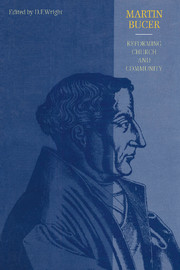Book contents
- Frontmatter
- Contents
- Notes on contributors
- List of abbreviations
- Introduction
- 1 Martin Bucer and the Old Church
- 2 The relation between church and civil community in Bucer's reforming work
- 3 Bucer's influence on Calvin: church and community
- 4 The church in Bucer's commentaries on the Epistle to the Ephesians
- 5 Church, communion and community in Bucer's commentary on the Gospel of John
- 6 Eucharistic communion: impulses and directions in Martin Bucer's thought
- 7 Martin Bucer and the ministry of the church
- 8 Infant baptism and the Christian community in Bucer
- 9 Bucer's ecclesiology in the colloquies with the Catholics, 1540–41
- 10 The Strasbourg Kirchenpfleger and parish discipline: theory and practice
- 11 Ecclesiological motifs behind the creation of the ‘Christlichen Gemeinschaften’
- 12 Martin Bucer in England
- 13 Martin Bucer and the Englishing of the Psalms: pseudonymity in the service of early English Protestant piety
- Bibliography
- Biblical index
- Index of Bucer's works
- Index of modern authors
- General index
1 - Martin Bucer and the Old Church
Published online by Cambridge University Press: 22 September 2009
- Frontmatter
- Contents
- Notes on contributors
- List of abbreviations
- Introduction
- 1 Martin Bucer and the Old Church
- 2 The relation between church and civil community in Bucer's reforming work
- 3 Bucer's influence on Calvin: church and community
- 4 The church in Bucer's commentaries on the Epistle to the Ephesians
- 5 Church, communion and community in Bucer's commentary on the Gospel of John
- 6 Eucharistic communion: impulses and directions in Martin Bucer's thought
- 7 Martin Bucer and the ministry of the church
- 8 Infant baptism and the Christian community in Bucer
- 9 Bucer's ecclesiology in the colloquies with the Catholics, 1540–41
- 10 The Strasbourg Kirchenpfleger and parish discipline: theory and practice
- 11 Ecclesiological motifs behind the creation of the ‘Christlichen Gemeinschaften’
- 12 Martin Bucer in England
- 13 Martin Bucer and the Englishing of the Psalms: pseudonymity in the service of early English Protestant piety
- Bibliography
- Biblical index
- Index of Bucer's works
- Index of modern authors
- General index
Summary
The term ‘the Old Church’ was not one which Bucer used for the continuing Catholic Church. It was Catholic controversialists such as John Faber who claimed for themselves the title of ‘the old religion’ (‘vetus religio’). Although on occasion he would speak of the ‘innovations’ (‘neüwerungen’) introduced by the Reformers, Bucer would hasten to add that they were in reality only the restoration of ‘das recht, alt und ewig’, the ancient, original form of the church, before it succumbed to eight hundred years of Roman abuse and tyranny. Like all the Reformers, especially those of some humanist provenance, he claimed apostolicity and antiquity for the reformed pattern, ‘our order’ (‘ordo noster’). He insisted on, and indeed practised, great respect for tradition. It was not the Reformers who had removed the ‘ancient landmarks’, but the papists who, for all their claims to continuity (‘langen prauch’), had continually introduced new teachings, laws, miracles, superstitious practices. The term ‘prisci’ (ancient, of former times) seems always to refer to the people of the early church.
His preferred terms for Catholicism were ‘the church of Antichrist’, ‘the mob of priests’, the ‘religion of the pope’, ‘the so-called Roman church’ ‘the churches still subject to the tyranny of the pope’, ‘the false church’ (‘pseudoecclesia’), ‘your synagogue’.
- Type
- Chapter
- Information
- Martin BucerReforming Church and Community, pp. 5 - 16Publisher: Cambridge University PressPrint publication year: 1994
- 3
- Cited by



